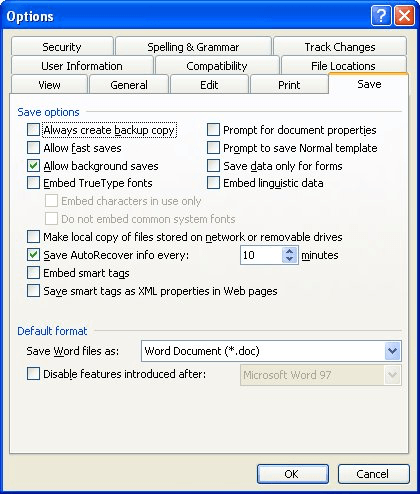Please Note: This article is written for users of the following Microsoft Word versions: 97, 2000, 2002, and 2003. If you are using a later version (Word 2007 or later), this tip may not work for you. For a version of this tip written specifically for later versions of Word, click here: Saving Your Work Automatically.
Written by Allen Wyatt (last updated April 9, 2022)
This tip applies to Word 97, 2000, 2002, and 2003
We've all done it. You're working along for several hours on a document, when suddenly the power goes out. Or you kick the reset button on your computer, or your three-year-old pulls the power cord out of the wall. The list goes on, but the bottom line is that you lost the past couple of hours of work. Many things spring to mind at a time like this. Most of them can't be printed in a nice, family-oriented newsletter like this. But hopefully you learned a lesson when this happened to you.
Word allows you to protect yourself by automatically saving your work for you. To set the automatic saving feature, follow these steps:

Figure 1. The Save tab of the Options dialog box.
When designating an AutoSave frequency, you should probably not select a time under 10 minutes. More frequent saves can waste time and become counterproductive.
You should also note that AutoSave does not really save your file. What it does is to save information that Word can use to try to recover your file if Word stops unexpectedly.
WordTips is your source for cost-effective Microsoft Word training. (Microsoft Word is the most popular word processing software in the world.) This tip (1009) applies to Microsoft Word 97, 2000, 2002, and 2003. You can find a version of this tip for the ribbon interface of Word (Word 2007 and later) here: Saving Your Work Automatically.

The First and Last Word on Word! Bestselling For Dummies author Dan Gookin puts his usual fun and friendly candor back to work to show you how to navigate Word 2019. Spend more time working and less time trying to figure it all out! Check out Word 2019 For Dummies today!
Want to control the name and location of your document backup? Here are some ideas that may help.
Discover MoreYou may often need to create two versions of the same document, one with everything and the other with a subset of what ...
Discover MoreYour macros can easily add information to the end of an existing text file. This is done by opening the target file in ...
Discover MoreFREE SERVICE: Get tips like this every week in WordTips, a free productivity newsletter. Enter your address and click "Subscribe."
There are currently no comments for this tip. (Be the first to leave your comment—just use the simple form above!)
Got a version of Word that uses the menu interface (Word 97, Word 2000, Word 2002, or Word 2003)? This site is for you! If you use a later version of Word, visit our WordTips site focusing on the ribbon interface.
Visit the WordTips channel on YouTube
FREE SERVICE: Get tips like this every week in WordTips, a free productivity newsletter. Enter your address and click "Subscribe."
Copyright © 2026 Sharon Parq Associates, Inc.
Comments